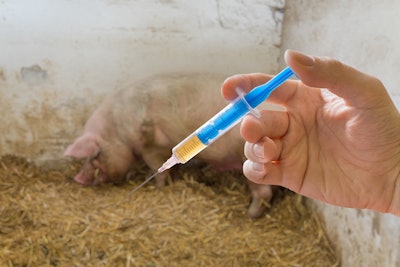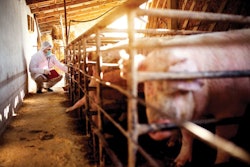
In the Philippines, the Department of Agriculture (DA) has announced it is expanding the government-controlled African swine fever (ASF) vaccine rollout nationwide.
Set to benefit are large farms and smaller herds, reports the official Philippine News Agency (PNA). With the inclusion of commercial premises, more pigs can be vaccinated more quickly, officials say. They explain that the farms must request inclusion in the campaign in writing to the DA. Then officials will visit the premises to assess biosecurity standards and preparations for vaccination.
One stumbling block in the ASF vaccination campaign so far appears to be a shortage of sampling and testing capacities, according to PNA.
Vaccines can only be administered to healthy growing pigs (age six weeks or more) that have tested negative for the ASF virus. This requires the collection and testing of blood samples, and there are not enough accredited labs with the capacity to handle these and the follow-up checks taken 14, 28 and 120 days post-vaccination.
PNA reports that proposed solutions to free this bottleneck include the accreditation of more private laboratories, and the authorization of farm veterinarians to collect and submit blood samples.
Latest data from the Philippines indicate that there are 505 zones in the Philippines with ASF outbreaks. These are located in 10 of the nation’s 17 regions.
ASF developments elsewhere in Asia
Over the past week, the veterinary authority in South Korea has confirmed the most recent ASF outbreak on a farm.
According to the notification to the World Organisation for Animal Health (WOAH), this affected a commercial premises with 4,279 pigs in the northeastern province of Gangwon.
It brings to 47 the number of outbreaks on the nation’s farms over the past five years.
One additional wild boar has tested positive for the virus, according to Pig & People, bringing South Korea’s total in this population over the same period to 4,167.
Since the end of August, ASF cases have been identified in three districts in the northeast Indian state of Nagaland.
Movement and other restrictions have been extended since pig mortality increased in the district of Tseminya, reported Nagaland Tribune recently.
Latest update in its assessment of the ASF situation in Asia by the United Nations' Food and Agriculture Organization (FAO) refers to new outbreaks in Central Vietnam.
These have occurred in Dak Lak and Gia Lai, which are provinces in the Central Highlands region, and border Cambodia.
Constant, elevated level of ASF cases in German wild boar
Since the summer months, the ASF situation among Germany’s wild boar population has remained consistently high, reported Schweine at the end of last week. Since July, confirmed cases have been running at around 100 per month — much higher than earlier in the year.
For the month to October 23, 122 wild boar in the country have tested positive for the ASF virus, according to the national veterinary agency, the Friedrich-Loeffler Institute. Of these, eight were found in the eastern state of Brandenburg, and all the rest in Hesse in central Germany.
On a positive note, Schweine reports that restrictions have been lifted in the Ludwigslust-Parchim district in Mecklenburg-West Pomerania. Several outbreaks in the wild population were reported to WOAH in that area in 2021 and 2022.
This month, according to the same source, an intensive and targeted search in the Bergstrasse district of Hesse revealed 44 wild boar carcasses in various stages of decomposition. Of these, 25 have already tested positive for the ASF virus. As some of these were found outside the fences designed to contain the infection, the “core” area has been expanded by the Hesse authorities. This entails added restrictions on hunting, and walkers are urged to stick to the paths, and to keep dogs on the lead.
Germany’s pig owners are reminded that strict biosecurity is the only way to protect the domestic population from ASF.
More wild boar test positive for ASF in Europe
Over the period October 16-23, further cases of ASF were confirmed in wild boar by eight European states. This is according to the Animal Disease Information System from the European Commission (EC), which monitors listed animal diseases in European Union member states and adjacent countries.
Poland and Germany each recorded 39 new cases during that week, Latvia 29 and Bulgaria 13. Smaller numbers of cases were confirmed by Hungary, Italy, Lithuania and Slovakia.
So far in 2024, 21 countries in the region have confirmed to the EC a total of 5,299 ASF outbreaks in their respective wild boar populations.
For comparison, the EC logged more than 7,900 outbreaks in this category in 20 countries across the region during the whole of 2023.
New cases in domestic pigs in 4 European countries
As of October 23, the EC had been informed by 15 countries about cases of ASF affecting their domestic pigs, bringing the regional outbreak total in this population to 657.
During the whole of last year, 16 of the region’s states recorded a total of 4,513 ASF outbreaks in this category with the EC.
Registering the most outbreaks in domestic pigs since the start of this year has been Serbia, whose total stands at 266. Next come Romania (now with 171) and Ukraine (63). From the previous week, their totals rose by five, seven and one outbreak, respectively. There was also one further outbreak in Italy, increasing its total for the year to date to 30.
Further details of these outbreaks can be gained from recent reports from the veterinary authorities to WOAH.
The latest outbreak in Italy was at a farm in Lodi province in the Lombardy region. Details such as the number of pigs affected are omitted, but this was the sixth farm outbreak in this province since the end of August.
Since ASF was first detected in mainland Italy in January 2022, outbreaks have been confirmed in 46 commercial and non-commercial swine herds.
One of the five latest outbreaks reported by the Serbian authorities to WOAH involved a farm with 152 pigs. Four other outbreaks this month were in smaller herds of backyard pigs.
In Romania, each of the seven ASF outbreaks recently registered with WOAH affected a backyard herd of no more than 20 animals.
Meanwhile, the Ukrainian authorities have registered with WOAH one further outbreak in a village herd in the southern province of Odesa. After a brief hiatus, the virus has been detected again in Kharkiv in the east of the country, according to a separate official notification.
View our continuing coverage of the global African swine fever situation.
Japan records further cases of classical swine fever (CSF) in wild boar
Latest update on the classical swine fever (CSF) situation to WOAH by the Japanese animal health agency outlines a further 704 confirmed cases in the wild population.
Covering the first six months of 2024, infected animals were found in 36 prefectures in seven of the country’s eight regions.
Only the northernmost main island/region of Hokkaido has been free of the disease over this period. Registering the most cases were the prefectures of Gifu (137 cases; Chubu region in central Honshu) and Gunma (85 cases; Kanto region, which covers Greater Tokyo).
Confirmed in mid-August of this year, Japan's most recent CSF outbreak in domestic pigs was its 93rd in this population.
Like ASF, CSF (also known as hog cholera) is a notifiable disease that affects members of the pig family, according to the WOAH. Both diseases can cause devastating losses in domestic and wild populations, while not impacting human health.
Despite the similar names and impacts, CSF and ASF are caused by unrelated viruses.


















